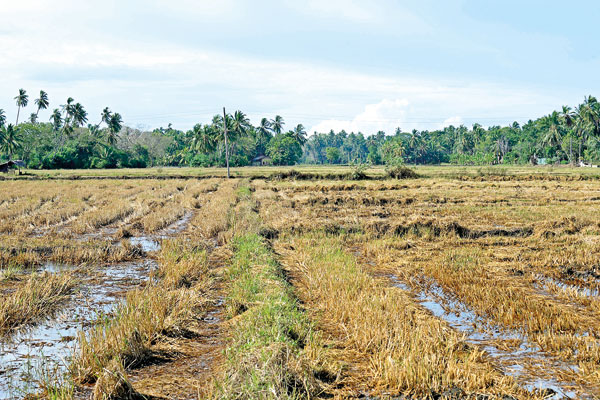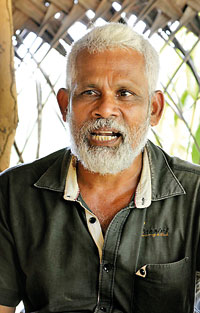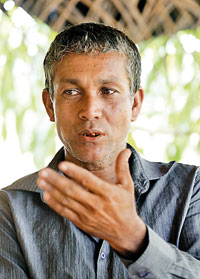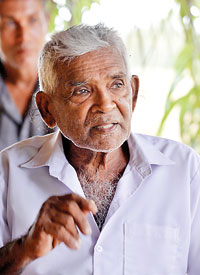News
Agriculture was a part of our culture, but now a cultural desert leaves fields bare

Tissamaharama: Paddy fields being readied for next harvest. Pix by Indika Handuwala
President Gotabaya Rajapaksa and the Sri Lanka Podujana Peramuna (SLPP) drew massive support from rural Sri Lanka at the last Presidential and general elections, with farmers making up the biggest voter base that propelled them to power.

W. P. Sunil
That was before the President’s ad hoc decision to ban chemical fertiliser and introduce organic farming, one of his Government’s many policy blunders that has plunged the country into an economic mess and is threatening the livelihoods of thousands of people across the country.
The President admitted recently the ban on fertiliser imports in May last year, was a mistake and announced that the Government would reintroduce the chemical fertiliser at subsidised rates. But that was little comfort for thousands of farmers who had seen a drop of 40% in their paddy yield for the Maha season with the prospects for the upcoming season looking bleak.
In the village of Diyasyaya in Tissamaharama, among many of those who voted for the current President and government, the sense of despondency that had set in across the country was gripping them too.
“The people in our district voted for the President and several members of the Rajapaksa family who contested from the Hambantota District which enabled them to win six of the seven seats from Hambantaota but today most of the same voters are angry and frustrated because the fertiliser ban has dealt us a severe blow and is pushing our families to the brink of poverty,” said G. A. Nimal, a farmer who cultivated around six and a half acres paddy during the Maha season.

G. A. Nimal
In the last Presidential election, Gotabaya Rajapaksa won 66.17% of the votes in the district while at the Parliamentary election held in August 2020, the SLPP won six of the seven seats winning more than 75% of the total vote but the fertiliser ban has hit the very same voters the hardest.
“The fertiliser ban has left the farmers impoverished and in turn the country impoverished,” said Nimal, who like many other farmers, has taken to growing vegetables and other crops such as green gram to obtain an income.
The latest available statistics from the Census and Statistics Department, during the Yala season – May to end of August – for last year, net extent cultivated was 30,134 hectares in the district with total production at 175,190 metric tonnes. Even though the fertiliser ban come into effect in May last year, farmers were able to get fertiliser from available stocks but by the time they got ready to harvest the next Maha season which runs from September to March, the stocks of fertiliser available had shrunk and whatever was available was hoarded by unscrupulous traders and sold in the black market at more than four times the price.
“A one litre bottle of pesticide which is enough to cover an acre of land was sold before the ban at Rs. 4300, and not it is being sold at Rs 18,000 in the black market. For the next season, these stocks will not be available,” said W. P. Sunil, another farmer in the area.

A. A. Sirisena
In addition to the non-availability of paddy, the fuel shortage had also affected farmers during this year’s Maha season.
“We had to hire the rice paddy cutting machine but there was a shortage of fuel. We were asked to stay in queues and obtain the fuel for the vehicle. Some days we stayed overnight to get the fuel,” Sunil said.
The quantity of locally produced rice has decreased due to which the Government has begun importing rice from several countries, thus pushing prices up. This has saddened the farmers who feel they have been unable to provide adequate stocks to the people as they have had to also keep adequate stocks for their families.
“If we were given the fertiliser there would be no requirement to import rice. We would have had enough for our own consumption and also provided adequate stocks for people who buy their rice in the market,” Sunil said.
The farmers see merit in moving to organic fertiliser use but they want it done in a methodical way.
“The way it was done was wrong. We could have moved towards organic farming gradually starting first with 20% organic 80% chemical fertiliser and changing this equation by about ten per cent each season. Then in about five years, both the soil and the seeds would have adapted to the new kind of fertiliser and the yield would have picked up,” he said.
One silver lining in this grim tale was that farmers were able to get a better price for their paddy with private buyers’ offerings Rs. 110 for a kilo – about Rs 30 more than the Government.
“Because of the shortage in production, the private mill owners were eager to get as much of our stocks as possible and offered us a better price,” G. A. Nimal said.
With the Yala season starting next month, farmers are now rethinking if they should spend their limited savings or take loans to harvest this season, given the high chance that the yield this season could be even less than the last one.
“We managed to some extent during the Maha season as some fertiliser stocks were available in the black market, but most farmers are having second thoughts about harvesting the next season even though the Irrigation Department has already begun to release water to our fields,” said A. A. Sirisena, another farmer in the area.
The best way to say that you found the home of your dreams is by finding it on Hitad.lk. We have listings for apartments for sale or rent in Sri Lanka, no matter what locale you're looking for! Whether you live in Colombo, Galle, Kandy, Matara, Jaffna and more - we've got them all!

